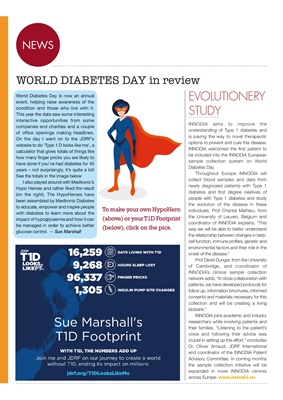
NEWS
WORLD DIABETES DAY in review
World Diabetes Day is now an annual
event, helping raise awareness of the
condition and those who live with it.
This year the date saw some interesting
interactive opportunities from some
companies and charities and a couple
of office openings making headlines.
On the day I went on to the JDRF's
website to do 'Type 1 D looks like me', a
calculator that gives totals of things like
how many finger pricks you are likely to
have done if you've had diabetes for 45
years - not surprisingly, it's quite a lot!
See the totals in the image below
I also played around with Medtronic's
Hypo Heroes and rather liked the result
(on the right). The HypoHeroes have
been assembled by Medtronic Diabetes
to educate, empower and inspire people
with diabetes to learn more about the
impact of hypoglycaemia and how it can
be managed in order to achieve better
glucose control. -- Sue Marshall
To make your own HypoHero
(above) or your T1D Footprint
(below), click on the pics.
INNODIA aims to improve the
understanding of Type 1 diabetes and
is paving the way to novel therapeutic
options to prevent and cure this disease.
INNODIA welcomed the first patient to
be included into the INNODIA European
sample collection system on World
Diabetes Day.
Throughout Europe INNODIA will
collect blood samples and data from
newly diagnosed patients with Type 1
diabetes and first degree relatives of
people with Type 1 diabetes and study
the evolution of the disease in these
individuals. Prof Chantal Mathieu, from
the University of Leuven, Belgium and
coordinator of INNODIA explains, "This
way we will be able to better understand
the relationship between changes in betacell function,
immune profiles, genetic and
environmental factors and their role in the
onset of the disease."
Prof David Dunger, from the University
of Cambridge, and coordinator of
INNODIA's clinical sample collection
network adds, "In close collaboration with
patients, we have developed protocols for
follow up, information brochures, informed
consents and materials necessary for this
collection and will be creating a living
biobank."
INNODIA joins academic and industry
researchers while involving patients and
their families. "Listening to the patient's
voice and following their advice was
crucial in setting up this effort," concludes
Dr. Olivier Arnaud, JDRF International
and coordinator of the INNODIA Patient
Advisory Committee. In coming months
the sample collection initiative will be
expanded in more INNODIA centres
across Europe. www.innodia.eu
EVOLUTIONERY
STUDY